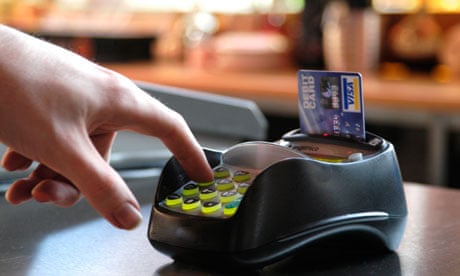Credit and debit cards have been in use for more than half a century yet they have, until now, made little impact on the cashflow of small businesses.
Card-reading terminals are expensive for banks to provide to merchants and so monthly rental fees, plus the cost of a dedicated phoneline, can equate to a monthly bill well in excess of £50. Contracts typically tie businesses to a provider for two years or longer and so small companies do not have a cost-effective way to discover if the boost to cashflow offsets the set-up costs.
This could be about to change, however, with the introduction of several systems that do not follow the traditional model of fixed card readers which are supplied with monthly rental bills. Instead they use the processing power of modern smartphones to accept credit and debit card payments with very little, or no, upfront cost and no contractual tie-in period.
They work through two types of card reader. One slots into a smartphone, asks the owner to insert their card and sign the screen to authorise payment. The second approach is to have a separate card reader that closely resembles terminals found in shops. It communicates with its "paired" smartphone over the airwaves via Bluetooth. The device has to be separate because, for security reasons, card issuers will not allow a PIN to be entered into a smartphone.
Commissions vary but are typically between around 2.75% and 3.5%. Payment usually takes place within two to three working days. Early adopters are reporting that this speed is having a beneficial impact on cashflow.
Personal fitness trainer David Sinclair runs Five Star Fitness from his Glasgow home studio and used to find people were coy about booking a new series of personal training sessions ahead of payday. He now uses a credit card reader from iZettle, which slots in to his iPhone and iPad, and waiting for clients to get paid is no longer an issue.
"I sell blocks of 10 sessions, which cost £400, so it's quite a lot of money for people to find if they're not being paid for a week or two," he says.
"So they'd be tempted not to book their next series or miss training for a couple of weeks until they had been paid. It's not an issue if you can take credit cards because they can obviously pay their card off after they've been paid. It's had a huge impact on my business because I used to have to waive payment until pay day but now I can get instant payment."
Invoices not only take a long time to be paid, in comparison to card payments, they can also take up a lot of administration. Certainly, Paul McDonnell, managing director of home cinema installers, MD Integration, is finding a new slot-in reader from SumUp is saving both time and money by allowing him to take payment without waiting for cheques to arrive in the post.
"We're saving so much time now not having to constantly post invoices and then issue reminders and then call up people to see if they've got the reminder," he says. "Also a lot of people want to put payments on cards, particularly deposits, because they know they've got extra consumer protection from their card issuer.
"We used to have a fixed terminal in the office that people would have to call through to and give over their card details, but the machine cost us hundreds of pounds per year. Our mobile card reader charges a tiny bit more per transaction but there's no upfront or monthly rental costs, so it's a lot more cost-effective."
Mobile card readers are also beneficial to cashflow because the money is stored electronically, where it cannot be stolen, and orders can be increased on the day if a customer decides to ask for additional goods or services. John Mumford, co-founder of JK Cleaning, uses a chip and pin reader, which communicates with his Blackberry smartphone and not only feels safer, he has virtually done away with queuing up at the bank to pay in cheques.
"We used to deal mainly in cash and cheques but neither was very good," he says. "Some of the areas we work in are not exactly the kind of places you want to be carrying around a lot of cash. With cheques you've got to go to the bank, which can be pain, I'd rather spend the time with customers.
"If you rely on cash, people have often got that amount on them and so are limited to what they originally asked you to do. If you can take credit and debit cards they may ask you to, say, clean the upstairs as well as downstairs, so it's a great way of upselling."
Taking card payments is not only good for upselling, it is proving crucial in winning business in the first place for Larry Tawose. His two-person catering company, Jemmy's Investment, recently started taking card payments through a chip and pin terminal from WorldPay and he claims potential clients now take him far more seriously.
"It's hard to quantify precisely but I'd estimate business is up by around 40%," says. "If you don't take cards larger companies won't deal with you because they assume you are too small to fulfil their orders. So taking mobile card payments has enabled us to look big and win contracts with businesses which wouldn't have worked with us if we could only accept cash."
This content is brought to you by Guardian Professional. To receive more like this you can become a member of the Small Business Network here.

Comments (…)
Sign in or create your Guardian account to join the discussion